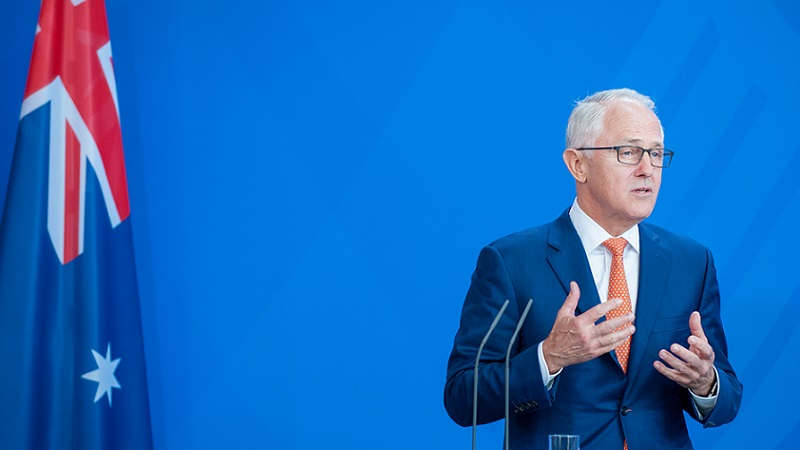Australia-China relations need a reset, and Malcolm Turnbull has to lead the way
April 29 2018

Note: This article appeared in the South China Morning Post on April 29 2018.
Australia-China relations need a reset. But this is unlikely as long as the Australian prime minister himself remains a stumbling block.
This month, Geoff Raby, a former Australian ambassador to China, said that things haven’t been this bad since 1989, when the Chinese government crushed student-led protests in Beijing.
Responding to such claims, Prime Minister Malcolm Turnbull was only prepared to concede there’s 'a degree of tension in the relationship'.
No Australian government minister has visited mainland China this year. And, despite China buying one third of Australia’s exports, its foreign minister, Julie Bishop, hasn’t set foot there in more than two years. It is still not clear when, or perhaps even if, Australia Week in China, the country’s premier trade and investment promotion event, will go ahead in 2018. And any hopes of a China-Australia Free Trade Agreement 2.0 coming out of the review clauses that were built into the original and hugely successful 2015 deal, are close to zero.
The chief executive of the Australian Chamber of Commerce in Shanghai, Udo Doring, recently reminded Australia’s political leaders that 'there is no upside for business if the relationship continues to sour'.
Turnbull dismisses all this as being due to 'criticism in China of our foreign interference laws' and 'misunderstandings and mischaracterisations' of the proposed legal changes by some Chinese media. Among other measures, the Australian government intends to ban political donations from foreign sources.
In December 2017, the Chinese government’s English language flagship China Daily said it was 'not inappropriate' for Australia to ban foreign donations. But the biggest complaints have come from the US Chamber of Commerce in Australia, which said the changes would obstruct their normal day-to-day lobbying activities.
The Law Council of Australia, media organisations, charities and even universities have also accused the government of overreach and impinging on freedom of expression.
What the Chinese government has objected to is being singled out by the prime minister, and to him lending his authority without any qualification to media reports alleging extensive Chinese Communist Party interference in Australian society.
Could they have a point?
On December 5 last year, at a press conference previewing the foreign interference laws, Turnbull said media reports of Chinese influence were 'disturbing' and that he and his colleagues took them 'very seriously'. This prompted the Chinese embassy in Australia to respond the following day that 'some Australian politicians' had made 'irresponsible remarks' and they 'categorically reject[ed]' the allegations.
On December 7, when tabling the bill on the floor of Parliament in Canberra, Turnbull again cited media reports claiming that the 'Chinese Communist Party has been working to covertly interfere with our media, our universities and even the decisions of elected representatives right here in this building'.
He then chose to quote Chinese political scripture, insisting that the laws were about Australians 'stand[ing] up' against foreign interference, just as Chinese leader Mao Zedong is said to have declared the Chinese people had done at the formation of the People’s Republic in 1949. The next day, China’s foreign ministry in Beijing said they were 'shocked by the Australian leader’s remarks'.
Still apparently feeling no need to adopt a more diplomatic course, on December 9, Turnbull repeated the 'stand up' line but this time also delivered it in Chinese.
And the background to all this was a rhetorical tilt by the Australian government against China that a survey by the Australia-China Relations Institute showed began back in January 2017.
The Chinese government is also not alone in questioning the evidence base underpinning reports of Communist Party interference.
Last month, 80 of Australia’s leading scholars of China and the Chinese diaspora signed an open letter stating that when untoward Chinese government interference 'is substantiated by clear evidence, there should be no hesitation in applying scrutiny and appropriate penalties'.
But they also said that, 'too often', the Australian media narrative had put 'a sensational spin on facts and events', and their collective expertise had led them to conclude there was 'no evidence' that Chinese actions 'aim at compromising [Australia’s] sovereignty'.
There were some signs earlier this year that Turnbull might be seeking a thaw with Beijing. Prior to his visit to Washington in February, he distanced himself from the position of US defence and intelligence agencies that China was now to be regarded as a 'threat'. Yet there’s just as much reason to surmise that not much has changed.
Last October, Turnbull refused to sign a Memorandum of Understanding (MOU) with China outlining cooperation on its infrastructure-focused 'Belt and Road Initiative' because he preferred to 'focus on specifics, on specific projects and investments'.
But when standing next to US President Donald Trump in February, he announced the signing of an MOU with the US to support infrastructure investment 'in Australia, the United States and Indo-Pacific region': no specifics, no projects, no investments.
And earlier this month, when wild speculation captured headlines in Australia that China had designs on establishing a military base in Vanuatu – a prospect that every Pacific island insider and expert has panned – the Australian prime minister’s response was to rush to say that it would be a 'great concern'. It took him more than a week to accept the insistence of the Vanuatu prime minister that the reports had 'no basis in fact'.
It’s said that positive change starts at the top. The Australia-China relationship had better hope this change comes soon.
Professor James Laurenceson is Deputy Director of the Australia-China Relations Institute (ACRI) at the University of Technology Sydney.

